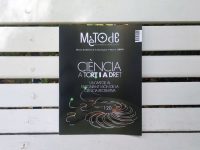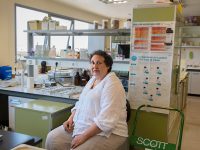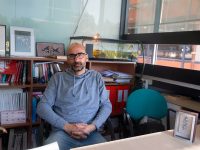 Anna Mateu Anna Mateu |
||
|
Dominique Pestre, director of studies at the École des Hautes Études en Sciences Sociales (EHESS) in Paris, arrives at the Cerveró Palace with a fresh and casual air. This historic building, owned by the University of Valencia, is the headquarters of the López Piñero Institute for the History of Science and Medicine and the place chosen for the interview. In perfect academic English, Pestre introduces himself, greets us and asks in what language the conversation will be. The answer is French. Satisfied with the reply, he starts on the path to the elevator that will lead to a more intimate room. His appearance is far from the clichés and preconceived ideas that we often have about researchers. Tall, thin, with impeccable and youthful hair, and very fashionable clothing. Plastic black glasses with beige details, white shirt with the top buttons unbuttoned and a dark blazer that he takes off for the interview. He looks like a bohemian character from the Parisian twenties, rather than a teacher of physics and of French physicists. While he takes a seat, serenely, nerves and pressures seem to be far from the life of Pestre, one of the main French representatives of the political, social and cultural history of science. This trained physicist is currently the Chair of the Comité d’Histoire de l’Armement, linked to the French Ministry of Defence. He is also an adviser in questions of science and society in the Rhône-Alpes region (France) and has taught at schools and universities from all over the world, like in California, São Paulo, Rome, Geneva, Brussels, Zurich or even Harvard (Massachusetts). With a longstanding and fruitful curriculum, we have to highlight that for many years he has been the director of the Centre de Recherche en Histoire des Sciences et des Techniques de La Villette, and later of the Centre Alexandre Koyré. His relationship with the media is more than frequent, and that is why the experience in this field allows him to maintain a relaxed, calm and quite familiar tone throughout the interview. Have science and technology improved Western society? Have they made it more rational? Do you think the society we live in now is better than the one from the sixteenth century, for instance? The last words in this answer were written by Pestre three years ago now, in Science, argent et politique (Rovira i Virgili University). This work deals with the relationship between the scientific world and the political, economic and military world. It is centred above all on the great scientific systems that have been developed since the fifties of the last century. In the book, Dominique Pestre explains, in relation to the previous question: «If we speak about the rationalisation of industrial societies through science, it is a rationalisation that is introduced in the management of the industries and the administrations, in the macroeconomic management and in the management of the public health, in the armies and in military violence. Rational thought, with a strong mathematical and logical component, has ended up invading not just the thought that regulates war, but also what controls production; not just the administrative organisation, but also the biomedical complex.» You speak of a new model of production of knowledge, different to the classical model. Could you specify the traits of one and the other? «The discourse of pure science has therefore contributed to legitimising the wise and the intellectuals and to turning them into superior characters devoted only to knowledge and the public good, although these altruistic people were incorporated in a surprisingly new way to the world of business and industry based on knowledge», rounds off Pestre in Science, argent et politique. As for the national sentiment that is born with the appearance of the states in the last third of the nineteenth century, does science have a role in the construction of national identity? Could we, then, talk about scientific capitalism, in whose centre is a strong relationship between power, and science and technology? «Progress also has damaging effects» With such conclusive words, Dominique Pestre concludes his last answer. However, a couple of hours later, the scientist would talk to students of the University of Valencia in a seminar entitled On Science and Technical Production in the Last Thirty Years. Chronicle of a Mutation. |
 Anna Mateu Anna Mateu
«It is clear that progress is an advantage, but we have to ask ourselves who benefits from it. Nature, for example, does not exactly benefit from the current polluting society» «Science and technology have contributed to creating a more standardised, stabilised, scientific and governable society. But not a more rational one» «The space race in particular is more linked to international competition in the field of the development of science and technology to show the rest of the nations the progress, the improvement and, to some extent, the superiority of a nation»
|
|
© Mètode 2012 - 73. Online only. The Strength of the World - Spring 2012





